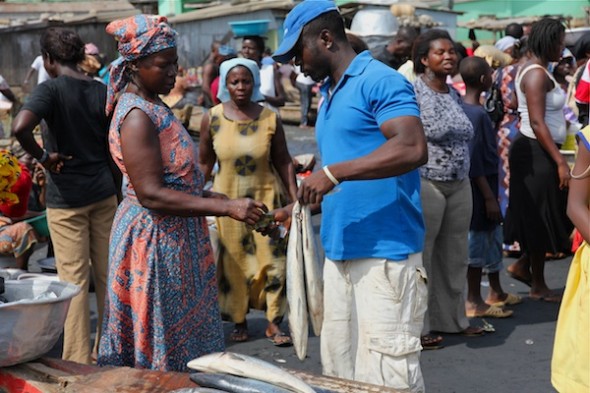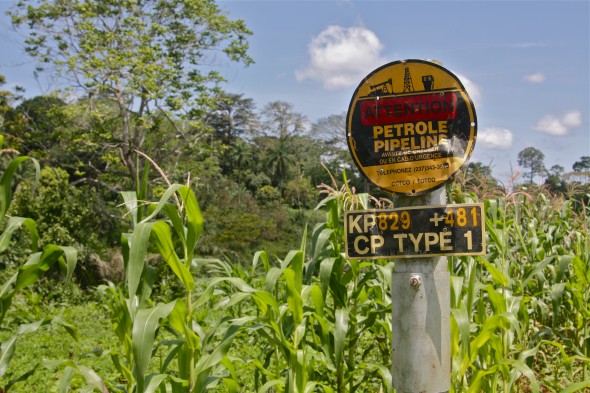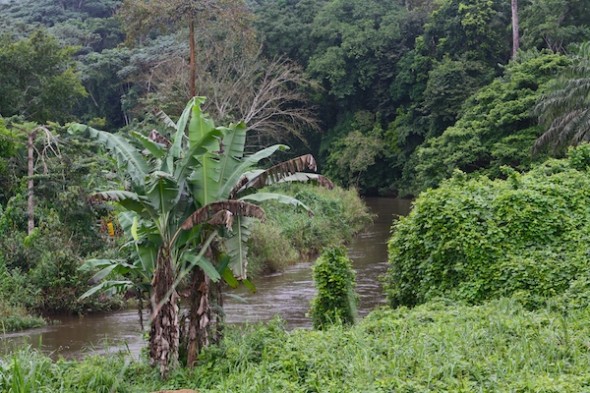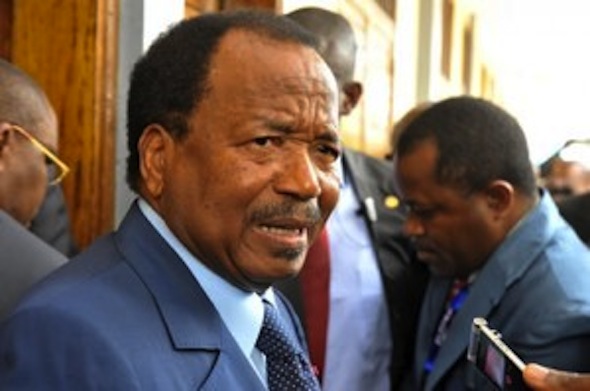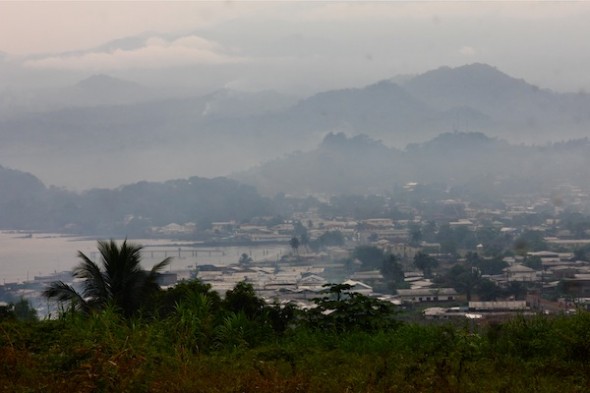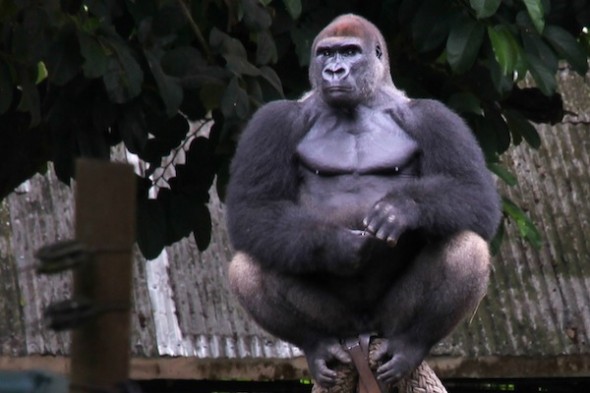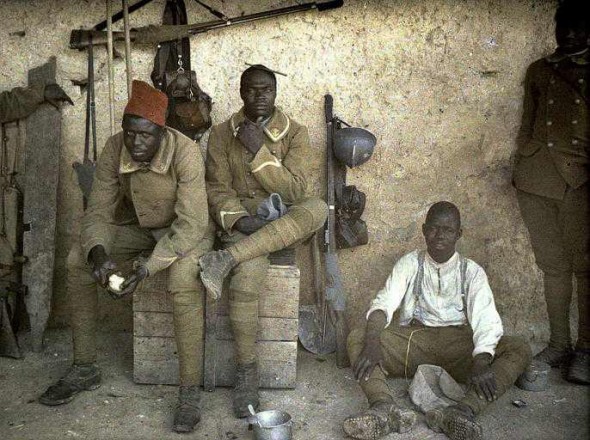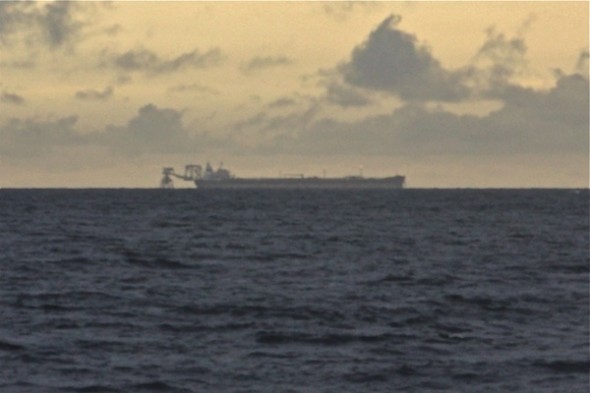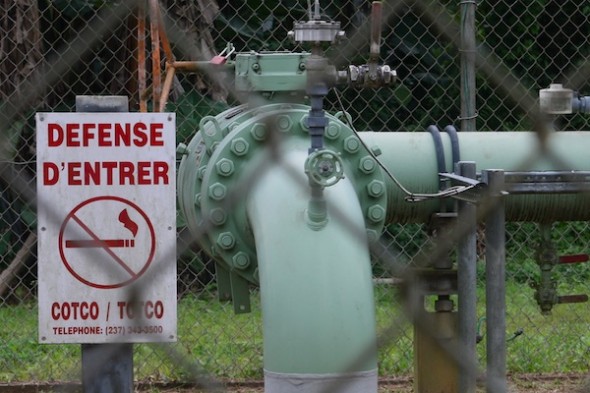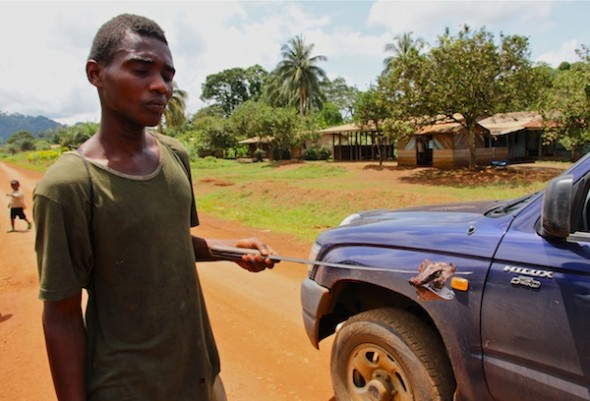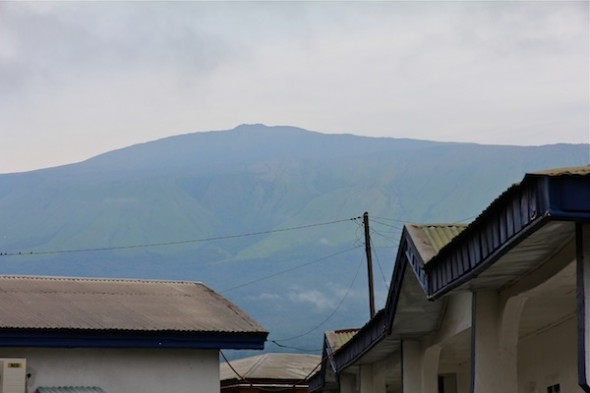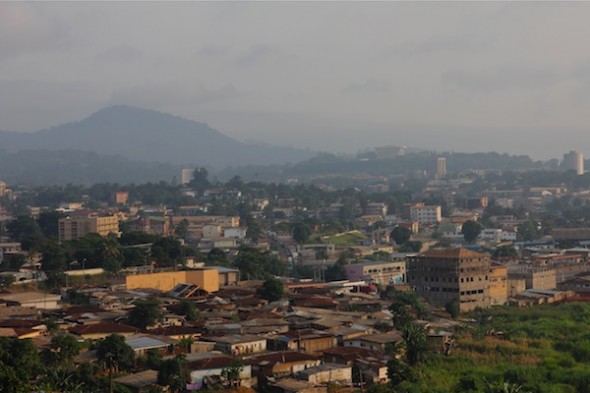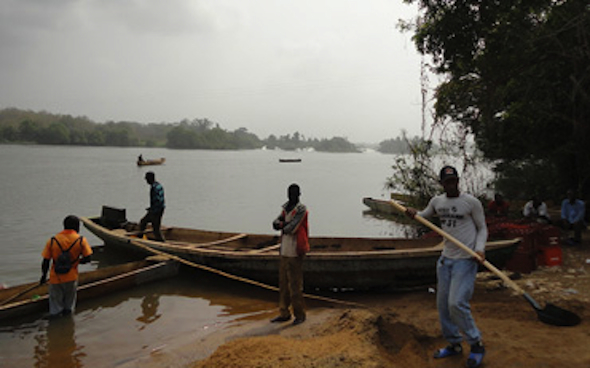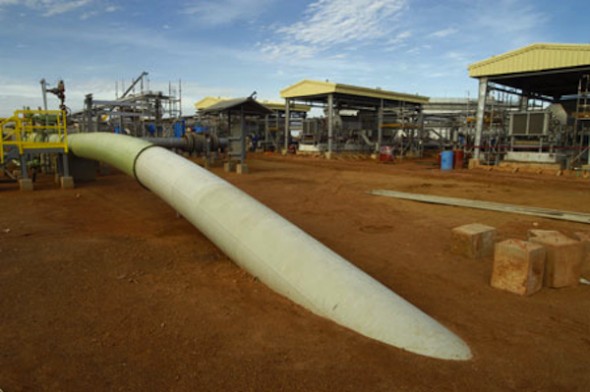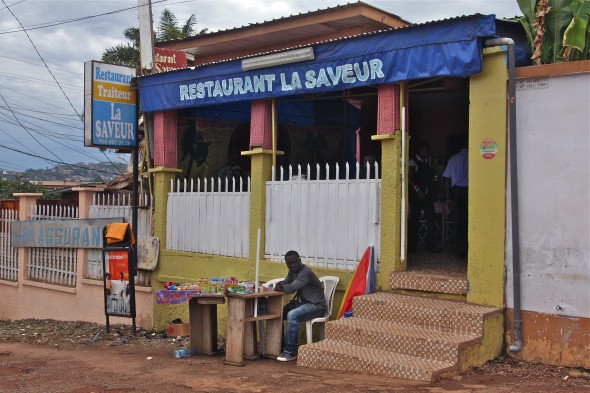Oil vs. fishing in Ghana — the conflicts continue
It has been ages since I’ve posted anything here (more on that below), but it seems that nothing much has changed — at least not for the fishing communities of Western Ghana. I first reported on conflicts between fishermen and Ghana’s new oil industry more than three years ago. Since then, oil exploration and drilling have increased, and the situation for fishermen has deteriorated. In the last few months three reporters have contacted me to talk about conflicts between fishing and oil.
Better late than never: Cameroon renegotiates pipeline transit fees
After ten years of operations, Cameroon has finally managed to renegotiate the paltry transit fees it collects on the Chad-Cameroon pipeline.
Cameroon will now receive 618.02 CFA francs ($1.30) per barrel of oil, up from 194.91 CFA francs. Since 2003 Cameroon was collecting less than U.S. 45 cents per barrel, a rate that was not linked to inflation or to the price of oil. Nor was the rate subject to regular review. Even the current rate, $1.30 per barrel, is low, but it will at least be raised every five years based on the rate of inflation.
The quantity of oil coming down the pipeline will soon increase as Niger has signed an agreement to use the pipeline. China National Petroleum Corporation (CNPC), the operator in Niger, will also use the pipeline for its Chadian operations. Exxon Mobil has not disclosed how much CNPC will pay to use the pipeline.
Read more:
Pipeline Tchad-Cameroun: Le droit de passage passe de 194 FCFA à 618 FCFA par baril
Niger awards second oil permit to CNPC, plans exports
Exxon fails to address pipeline safety risks, fined $1.7 million
“The U.S. Department of Transportation on Monday hit Exxon Mobil Corp. with a $1.7 million fine over a July 2011 pipeline failure that dumped more than 60,000 gallons of oil into Montana’s Yellowstone River after concluding the oil giant failed to effectively address pipeline safety risks,” writes Sean McLernon in the March 26th edition of Law360.
According to a news release from the Department of Transportation’s Pipeline and Hazardous Materials Safety Administration (PHMSA), “ExxonMobil failed to properly address known seasonal flooding risks to the safety of its pipeline system, including excessive river scour and erosion, and to implement measures that would have mitigated a spill into a waterway.”
I wrote about the Yellowstone River spill in September 2011 asking what lessons the Montana accident might have for Cameroon. To recap what I said then, environmentalists in Cameroon and Chad have long been concerned about the safety of the 1070 km Chad-Cameroon oil pipeline and have stated repeatedly that COTCO (Exxon Mobil pipeline operations in Cameroon) has not provided reliable information about its real capacity to respond in the event of an oil spill. Much of the pipeline crosses relatively remote and hard-to-access areas (few or no roads) and many question COTCO’s assertions that response teams could quickly travel to the scene of any incident.
More elections in Cameroon. Does anyone care?
Nearly 20 years after deciding that Cameroon needed a Senate, President Paul Biya recently announced that the country’s first Senate elections will be held on April 14, 2013. He made the surprise announcement at the end of February, leaving little time to organize a credible election.
Voters will elect 70 senators, while Biya will hand-pick the remaining 30, according the presidential decree read over state radio.
The SDF, Cameroon’s main opposition party, loudly denounced the elections and pledged a boycott, then in a awkward volte face several days later, agreed to participate. SDF party members now say the party will participate in the Senate elections as it does not think Biya, 80, will make it to the end of his term.
According to the Cameroonian constitution, the head of the Senate would assume the interim in the event of a mid-term presidential vacancy.
Biya’s planned senatorial elections seem to indicate that he is interested in perpetuating the status quo of Cameroonian politics into the post-Biya era.
Limbe: conflicted tourism
Limbe, in Cameroon’s Southwest Region, is a gem. A coastal city famous for its black sand beaches, Limbe is located on the southern slopes of Mount Cameroon, one of Africa’s largest active volcanoes. The town is surrounded by lush forest and is home to the Limbe Botanic Garden, a 48-hectare expanse of majestic greenery bordering the Atlantic.
The Limbe Wildlife Centre is another one of the city’s attractions. The center was founded in the early 1990s as a rescue and rehabilitation center for orphaned primates. The first time I visited the center it was an open space. I’ll never forget the gorilla who stood on two legs and walked straight up to me as if he wanted to say something. Amazing. Today, the center is divided up into compounds and feels more like a zoo, but it’s still a great place to visit and marvel the biodiversity of this country.
But there’s more to Limbe than beautiful scenery.
Cameroonian enterprise in…China
As my last post indicated, doing business in Cameroon is tough. But if the business climate is less than ideal for foreign investors, it’s even harsher for Cameroonians who don’t benefit from the incentive programs in place to attract foreign investment.
Kingsley Azieh Che was one of several Africans I met who run manufacturing companies in Guangzhou, China. Azieh Che, who is Cameroonian, attended university in Cameroon, but set up his business in China. Today he runs an apparel factory. He began buying ready-made clothes in China; as the business grew he started ordering custom-made clothing and when his orders became too large for his suppliers, Kingsley Azieh Che decided to go into manufacturing. He now takes orders from clients around the world.
Invest in Cameroon…Are you crazy?
Forbes’ Best Countries for Business list is out and Cameroon arrives at 137th place out of 141 countries ranked.
New Zealand the number one “Best Country for Business”, followed by Denmark, Hong Kong, Singapore, Canada, Ireland, Sweden, Norway, Finland and United Kingdom. The United States, with its “inadequate investment in deteriorating infrastructure, rapidly rising medical and pension costs of an aging population, sizable current account and budget deficits – including significant budget shortages for state governments – energy shortages, and stagnation of wages for lower-income families,” comes in at 12th place.
The countries at the bottom of this year’s list — the ten worst countries for doing business — are Cote d’Ivoire, Yemen, Mauritania, Ethiopia, Haiti, Cameroon, Venezuela, Zimbabwe, Chad and Guinea.
Thoughts on Remembrance Day from Cameroon
As Remembrance Day (Veterans Day in the U.S.) commemorations take place across Europe and North America, the descendants of African soldiers recruited to fight for the imperial forces during the two World Wars also remember service and sacrifice. These children and grandchildren continue to honor those who served and died, most without any recognition of their service or military pension.
Remembrance Day without Isaac
By Christopher Fon Achobang
Envoys of the German Embassy, British, Nigerian, South African, and Canadian High Commissions and the local administration of Cameroon, represented by the SDO of Fako Division met in Victoria, now Limbe, to ‘Remember’ the valiant soldiers who fell fighting for the crown of England in both World Wars. This is an annual event celebrated all over the British Commonwealth.
While U.S. votes, Cameroon “celebrates”
While Americans went to the polls to decide if Barack Obama would serve a second term, Cameroonians “celebrated” the 30th year in office of their president, Paul Biya.
Those who felt that 30 years in power was a cause for protest, rather than celebration, were met with tear gas and water cannons when they attempted to stage a peaceful opposition event.
“We had just started the peaceful march when a large number of well-armed police and gendarmes deployed by the repressive regime of Biya used water cannon, teargas and other weapons to disperse and brutalise thousands of our activists,” Jean Michel Nintcheu, an opposition member of parliament, told Reuters by phone from Douala.
Cameroon hires company for oil spill clean-up, nine years behind schedule
You learn all kinds of crazy things reading the news. Cameroon Online published a story from APA news on August 19th, Une firme francaise va faire de la depollution maritime au Cameroun.
According to the story, Cameroon’s Societe Nationale des Hydrocarbures (SNH, the state oil company) has signed an agreement with French company, Le Floch Dépollution, for maritime oil spill clean-up operations.
Better late than never.
Cameroon athletes “disappear” from Olympic Village
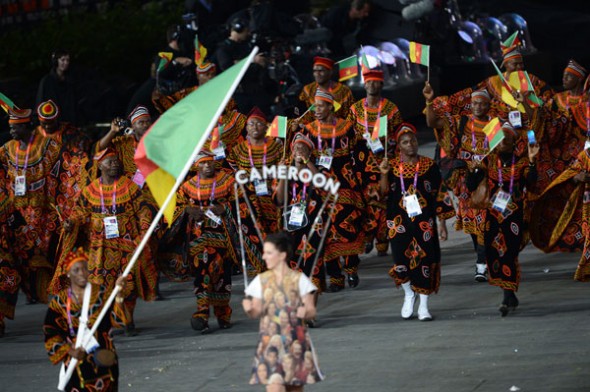
Photo: Cameroon's delegation takes part in the opening ceremony of the London Olympics on July 27, 2012. Credit: Christophe Simon / AFP/Getty Images
While President Paul Biya was jetting off to Switzerland for a “short, personal visit,” a number of the Cameroonian Olympic athletes bailed on Team Cameroon.
The Los Angeles Times reports:
Seven Cameroonian athletes have disappeared from the Olympic Village in London, a Cameroonian official said. Five boxers, a swimmer and a soccer player are missing, the state Cameroon Tribune reported, citing Team Cameroon chief David Ojong. The first to disappear reportedly was female soccer goalie Drusille Ngako, followed by swimmer Edingue Ekane Paul. The five boxers then vanished.
Pipeline news
Although the work I’m doing now in Cameroon is not directly related to the Chad-Cameroon pipeline, I’m getting updates on the pipeline as possible.
Last week I had a meeting at the Ministry of the Environment and Conservation and learned that Cameroon is once again trying to renegotiate the transit fees it receives for pipeline use. Although most of the pipeline is in Cameroon, which means that most of the environmental risk is in Cameroon, the country benefits only minimally from the operation. Most of Cameroon’s revenues from the project come in the form of transit fees collected on the oil pumped through the pipeline. Even at the time of signing, the rate (41 cents per barrel) was low and to add insult to injury, the transit fee isn’t indexed to inflation or to the cost of oil.
In the nine years that the pipeline has been operational, Cameroon has watched the price of oil skyrocket while its meager transit fees have remained unchanged. (See my December 2010 post on the lack of transparency surrounding Cameroon’s earnings from the pipeline.)
The road adventure continues
“Beware of the viper! He is venomous even after he has died.” This one was still writhing when we pulled up next to the group gathered at the side of the road. It sounded like a veiled warning.
Kosmos Cameroon: Oil exploration in a national park?
Kosmos Ghana gets most of the attention, but since I’m in Cameroon I decided to take a look at Kosmos Energy’s operations here. The company has a 100% interest in two onshore blocks, the Ndian River and Fako. Kosmos is also a non-operating partner (with a 30% interest) in a third block, the Kombe-Isepe. The company’s website provides some basic information on the blocks, including their size: “The company’s acreage position onshore Cameroon is the equivalent of more than 200 deepwater Gulf of Mexico blocks.”
Both the Ndian River and the Fako blocks are located in the vicinity of Mount Cameroon and the proposed Mount Cameroon National Park. In fact, a significant percentage of the Fako block is inside the proposed national park (Fako is another name for Mount Cameroon). The Ndian River block may also overlap the western edge of the park. The Kombe-Isepe block is located further east, between Douala and Edea.
There’s no information on the Kosmos website to indicate that the Cameroonian blocks are located in sensitive areas.
Yaounde landing…
I haven’t had a chance to post anything for a few weeks. I’ve just arrived in Yaounde, Cameroon, and hope to have more time to get information up in the coming days. I’m starting some new work and will look forward to writing about it.
In the meantime, I want to provide links to a few articles up at Ghana Oil Watch. As the months go by, the Jubilee Field projected 120,000 b.p.d. output level is looking increasingly like wishful thinking. It has been hard to get clear information on why — exactly — production is so low. Tullow and its partners have repeatedly cited technical issues as the cause, yet now that those issues are supposedly resolved, why haven’t production levels increased?
World Bank approves loan for Cameroon’s Lom Pangar dam
Once again the World Bank has signed on to a high-risk project with questionable poverty-reduction potential.
Of course, reading the press release from the World Bank, you would never guess that this project could be anything less than wonderful:
WASHINGTON, March 27, 2012 – The World Bank’s Board of Executive Directors today approved US$132 million in zero-interest financing for Cameroon’s Lom Pangar Hydropower Project (LPHP), to support the country’s economic development and significantly improve the supply of electricity to homes and businesses across Cameroon.
Cameroon quietly ups oil production
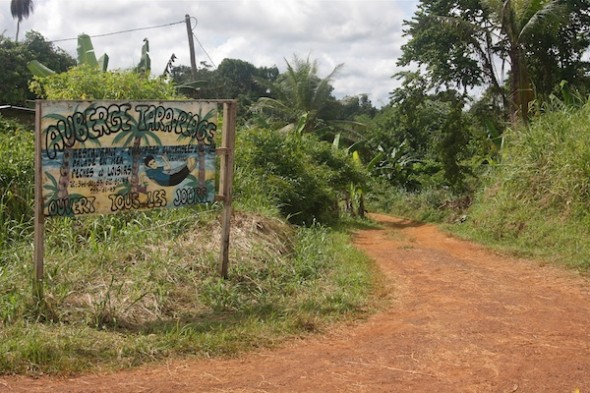
Kribi, Cameroon, where sleepy beach resorts will soon give way to a major port and gas plant. Photo by Christiane Badgley
Cameroon’s oil industry doesn’t get much international attention these days, but like its neighbors the country has seen growing offshore activity over the last few years. After years of declining output, the country’s production levels are once again on the rise.
The Scottish company, Bowleven, has been drilling in Cameroon for several years now and its hits and misses usually get some coverage in the business press. Kosmos Energy, Perenco, Shell, ExxonMobil and Noble Energy, among others, are also actively drilling in the country.
Although Cameroon’s oil production levels are close to those of Ghana, there’s no talk of transparent revenue management in Cameroon. The country recently had its EITI candidacy status renewed for another 18 months. It should be noted that the country was already “close to compliant” in 2010 and hasn’t made much progress since. According to EITI rules, “If Cameroon does not achieve Compliant status by 15 August 2013, it will be de-listed.”
Cameroon: Did you say election?

Yaounde, October 7, 2011. Photo: Sunday Alamba/AP
Do you know there’s a presidential election tomorrow (October 9th) in Cameroon?
Unless you’re Cameroonian or closely follow Cameroonian/African politics, you may not have heard anything about this election.
And yet…Paul Biya, president and favored presidential candidate, has been in office for nearly 30 years. That alone — in this year of massive political upheaval — would seemingly bring a bit more media attention to Cameroon’s upcoming election. If nothing else, one might ask why there’s no viable opposition in Cameroon and what this portends for the country’s future “stability” (“stability” being the grand achievement of Biya, who at 78, is not going to be around for much longer).
Pipeline oversight: Are independent monitoring panels effective, truly independent?
Over the past few weeks I’ve been scrutinizing documents on the safety and oversight of the Chad-Cameroon pipeline. As I wrote in an initial blog post, the ruptured ExxonMobil pipeline and subsequent oil spill in the Yellowstone River in Montana got me thinking about similarities with the ExxonMobil pipeline that crosses no fewer than 17 major rivers in Cameroon. I then wrote a follow-up post on pipeline oversight (or lack of).
So I was thrilled when I found out that Oxfam America was preparing a new report on the monitoring of controversial oil and gas projects featuring the Chad-Cameroon pipeline as one of its case studies. The report, Watching the Watchdogs, was launched yesterday in Washington, D.C. Among the speakers at yesterday’s panel were Jacques Gérin and Nadji Nelambaye who were both involved with monitoring the Chad-Cameroon pipeline.
Pipelines: More on the Montana – Cameroon connection
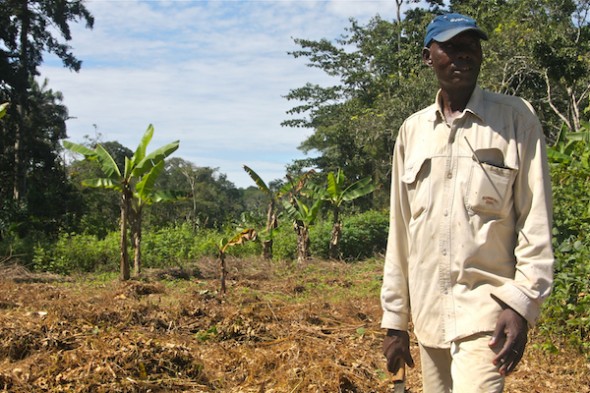
Farmer Jean Edzoa standing on the pipeline easement near Yaounde. He and other farmers in the area complain that "nothing grows" around the pipeline. Photo by Christiane Badgley
I recently wrote about ExxonMobil’s July oil spill in Montana and what lessons the Yellowstone River accident may have for Cameroon.
The same day an article in The New York Times, Pipeline Spills Put Safeguards Under Scrutiny, analyzed the regulation and oversight of the 167,000-mile system of hazardous liquid pipelines crisscrossing the United States.
The article describes a federal monitoring agency that is, “chronically short of inspectors and lacks the resources needed to hire more, leaving too much of the regulatory control in the hands of pipeline operators themselves…”
Exxon spill in Montana: lessons for Cameroon?
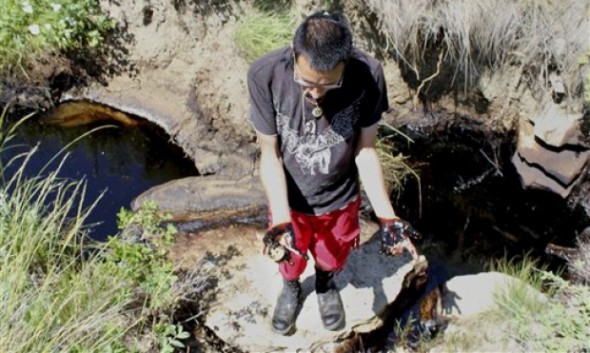
A member of the Blackfeet Tribe takes 'water' samples for a community hospital water lab near Cut Bank Creek, Mont. Photo: Destini Vaile/AP
On July 1 an ExxonMobil underground pipeline ruptured near Laurel, Montana, spilling tens of thousands of gallons of crude oil into the Yellowstone River. Montana is a long way from Africa, but this spill has me thinking about the Chad-Cameroon oil pipeline, another ExxonMobil underground pipeline that passes below several rivers where water pressure and erosion are real concerns.
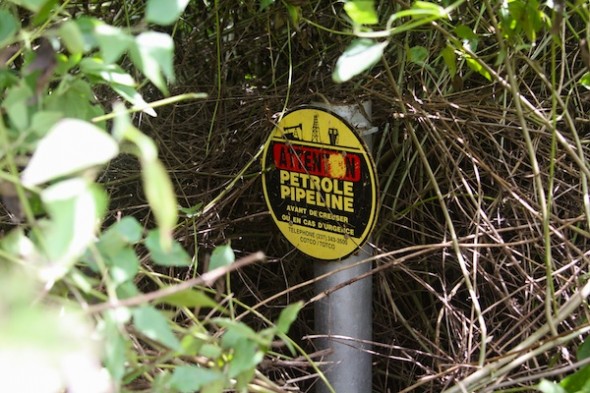
The 30 meter wide pipeline easement is supposed to be kept cleared at all times. This pipeline marker was buried under thick brush in clear violation of safety regulations. Photo by Christiane Badgley
Environmentalists in Cameroon and Chad have long been concerned about the safety of the 1070 km Chad-Cameroon oil pipeline and have stated repeatedly that COTCO (ExxonMobil pipeline operations in Cameroon) has not provided reliable information about its real capacity to respond in the event of an oil spill. Much of the pipeline crosses relatively remote and hard-to-access areas (few or no roads) and many question COTCO’s assertions that response teams could quickly travel to the scene of any incident.
Cooking oil vs. crude oil
Turns out that one of my most popular blog posts ever is a piece called “La Saveur” that I wrote back in November 2009.
La Saveur, the name of an inexpensive and delicious dining spot in Yaounde, was a post about Cameroonian food in general and ndole in particular.
Oil is not enough: Africa needs industrial development
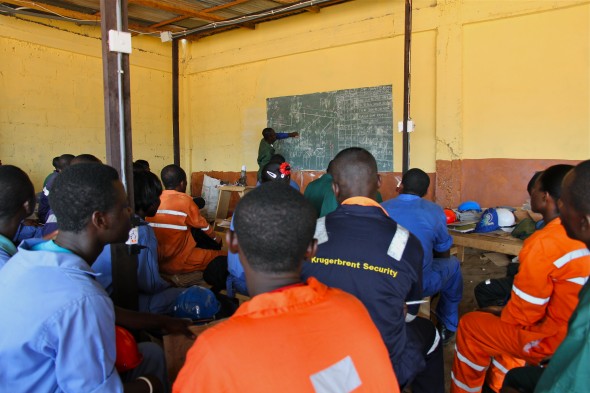
When industrial development arrives in Sekondi-Takoradi, there will be a trained workforce ready for employment. Photo by Christiane Badgley
This morning I came across an article in the Guardian, Africa must build industrial sector urgently, warns UN agency, and the timing could not be better. I’m in Guangzhou, China, marketplace for the world, and if you ever needed a reminder that manufacturing is what creates jobs and wealth and leads to real economic development, come here and look around.
Standing up for E.G.: We just need some more time
 Anatolio Ndong Mba, Ambassador to the United Nations for Equatorial Guinea, recently wrote a letter to The New York Times in response to a critical article in the May 31st edition of the paper. Here’s his letter:
Anatolio Ndong Mba, Ambassador to the United Nations for Equatorial Guinea, recently wrote a letter to The New York Times in response to a critical article in the May 31st edition of the paper. Here’s his letter:
To the Editor:
“An Iron Grip in Africa, With Ties to the U.S.” (Malabo Journal, May 31) presents an unrealistic and outdated image of Equatorial Guinea, a country that is struggling vigorously to become more free, to modernize itself and to provide a better standard of living for its citizens.

